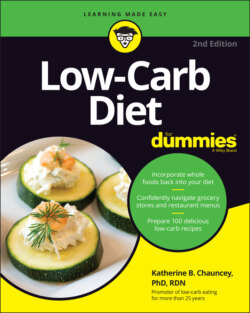Читать книгу Low-Carb Diet For Dummies - Katherine B. Chauncey - Страница 71
Phytochemicals
ОглавлениеPhytochemicals are compounds that exist naturally in all plant foods (phyto comes from the Greek word for “plant”). Scientists have identified about 10,000 different phytochemicals (or plant chemicals) in the foods you eat, and many still remain unknown. An apple alone has hundreds of phytochemicals. Carbohydrate foods such as fruits, vegetables, grains, legumes, seeds, licorice root, soy, and green tea all contain these plant chemicals. Phytochemicals are best supplied from fruits and vegetables — not from supplements.
Phytochemicals contain protective, disease-preventing compounds. Thousands of different phytochemicals have been identified as components of food, and many more phytochemicals continue to be discovered every day. Just one serving of vegetables gives you more than 100 different phytochemicals. See Chapter 25 for more information on phytochemicals.
Think of phyto as “fight-o.” Every mouthful puts disease fighters in your body. Phytochemicals occur to protect the plant from disease and destruction and continue to protect the humans who eat the plants.
Phytochemicals are associated with the prevention and/or treatment of at least four of the leading causes of death in the United States — cancer, diabetes, cardiovascular disease, and hypertension. They’re involved in many processes including those that help prevent cell damage, prevent cancer cell replication, and decrease cholesterol levels.
Table 3-1 lists a few phytochemicals and their sources in carbohydrate foods.
TABLE 3-1 Noteworthy Phytochemicals and Food Sources
| Phytochemical | Sources |
|---|---|
| Allyl sulfides | Garlic, onions, leeks, and chives |
| Capsaicin | Hot peppers |
| Carotenoids | Dark green and yellow fruits and vegetables |
| Coumarins | Citrus fruit, tomatoes |
| Ellagic acid, phenols | Grapes, berries, cherries, apples, cantaloupe, watermelon |
| Flavonoids | Citrus fruit, tomatoes, berries, peppers, carrots |
| Genistein | Beans, peas, lentils |
| Indoles | Broccoli, cabbage |
| Isoflavones | Soybeans, dried beans |
| Lignans | Flaxseed, barley, wheat |
| Lutein, zeaxanthin | Spinach, kale, collard greens, romaine lettuce, leeks, peas |
| Lycopene | Tomatoes, red peppers, red grapefruit |
| Phytic acid | Whole grains (barley, corn, oats, rye, wheat) |
| Saponins | Soybeans, dried beans |
